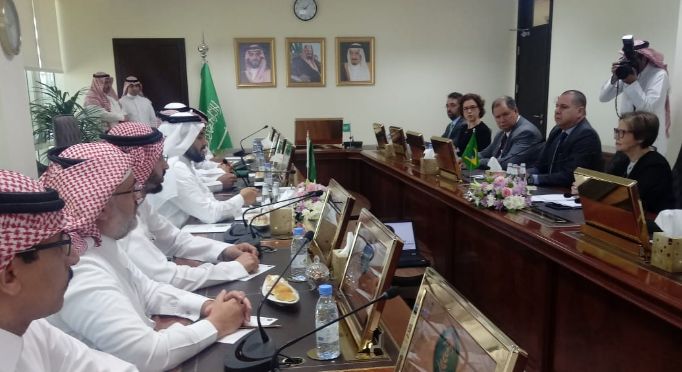Riyadh – Brazil’s Agriculture, Livestock and Supply minister Tereza Cristina had conversations with authorities in Riyadh this Monday (16) that may lead to deals for the Brazilian agribusiness industry. Saudi Arabia is the second stop in the minister’s tour of Arab countries, which began in Egypt and will also include Kuwait and ends next Sunday in the UAE.
In the Saudi capital, minister Cristina had a meeting (top picture) with the deputy minister of Environment, Water and Agriculture Mansour Bin Hilal Al Mushaiti. She was told that Saudi Arabia needs fodder for animal feed, which Brazil can supply. They also discussed the possibility of entering into a technical cooperation agreement for crop and livestock farming.
The minister also attended a luncheon offered by Brazil’s ambassador to Riyadh, Marcelo Della Nina, at his official residence. Brazilian and Saudi poultry industry representatives were in attendance. “I would like to assert that the Ministry is ready to make life easy for entrepreneurs. The Ministry cannot get in the way. We can do more together, as partners,” she said.
Saudi Arabia is an important market for Brazil, especially when it comes to poultry, of which it’s the second biggest buyer. According to the Brazilian Animal Protein Association (ABPA), year-to-date through July, Brazil shipped 280,000 tonnes of chicken meat to Saudi Arabia, up 5% from a year ago.
Later in the day, the delegates traveling alongside the minister were welcomed to the ambassador’s residence. After minister Cristina spoke, many of them said this Arab tour will likely give business a boost. Arab Brazilian Chamber of Commerce president Rubens Hannun said that anyone who deals with Arab countries is aware of the importance of one-on-one relationships.
Apart from the Arab Brazilian Chamber, the delegation comprises representatives from other organizations and corporations, including the Special Secretariat of the Partnerships and Investments Program, and congressman Alceu Moreira, who chairs the Parliamentary Front for Agriculture.
Translated by Gabriel Pomerancblum




